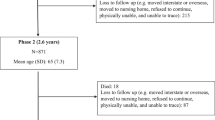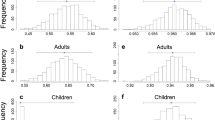Abstract
Objective: This paper uses observational data to explore what dietary constituents might be responsible for associations between energy density, energy intake and weight status among free-living individuals.
Design: Cross-sectional data on 5783 Chinese adults (aged 20–59 y) from the 1991 China Health and Nutrition Surveys were used to test for associations between energy density, energy intake and weight status, controlling for age, sex, height, activity level, smoking status, urban residence and income. Pearson correlation coefficients were calculated to identify nutrient intake correlates of energy density. Replacing energy density with its nutrient correlates (3 day mean estimates of fat, protein, fiber and water intakes) in the models predicting energy intake and overweight status, the independent effects of specific nutrients were investigated.
Results: Energy density was positively and significantly associated with energy intake and overweight status. Energy density was significantly correlated with every nutrient examined, although the correlations were weak for most variables except water intake. Only water intake behaved consistently across analyses. It was negatively correlated with energy density, negatively, significantly and independently associated with energy intake as well as overweight status. Despite positive associations with energy intake, fat and protein intake were not significant predictors of overweight status. Fiber intake was strongly and positively associated with overweight status.
Conclusions: Of the nutrients examined, only water intake appeared to explain the effects of energy density on energy intake and overweight status.
European Journal of Clinical Nutrition (2001) 55, 349–359
This is a preview of subscription content, access via your institution
Access options
Subscribe to this journal
Receive 12 print issues and online access
$259.00 per year
only $21.58 per issue
Buy this article
- Purchase on Springer Link
- Instant access to full article PDF
Prices may be subject to local taxes which are calculated during checkout
Similar content being viewed by others
Author information
Authors and Affiliations
Contributions
Guarantor: JD Stookey.
Contributor: Hypothesis, data analysis and manuscript preparation all completed by JD Stookey.
Corresponding author
Rights and permissions
About this article
Cite this article
Stookey, J. Energy density, energy intake and weight status in a large free-living sample of Chinese adults: exploring the underlying roles of fat, protein, carbohydrate, fiber and water intakes. Eur J Clin Nutr 55, 349–359 (2001). https://doi.org/10.1038/sj.ejcn.1601163
Received:
Revised:
Accepted:
Published:
Issue Date:
DOI: https://doi.org/10.1038/sj.ejcn.1601163
Keywords
This article is cited by
-
Dietary energy density and obesity: how consumption patterns differ by body weight status
European Journal of Nutrition (2018)
-
Dietary energy density is associated with obesity and other biomarkers of chronic disease in US adults
European Journal of Nutrition (2015)
-
Strong influence of dietary intake and physical activity on body fatness in elderly Japanese men: age-associated loss of polygenic resistance against obesity
Genes & Nutrition (2014)
-
Dietary energy density is associated with energy intake in palliative care cancer patients
Supportive Care in Cancer (2012)
-
Energy density of foods, but not beverages, is positively associated with body mass index in adult women
European Journal of Clinical Nutrition (2009)



